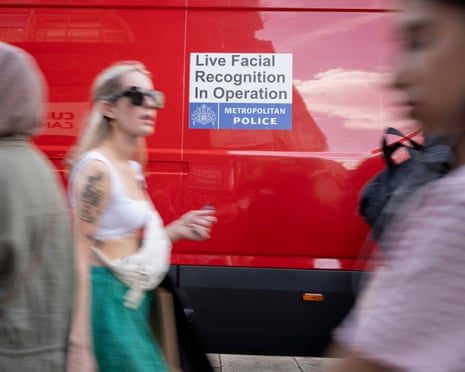Science
Expert Challenges Met Police’s Claims on Facial Recognition Use

The Metropolitan Police Service’s assertion that its use of live facial recognition (LFR) technology is bias-free has been challenged by a leading expert in the field. Prof. Pete Fussey, who conducted the only independent academic review of police facial recognition use, argues that the Met’s claims are not supported by the report they cite. This controversy arises as the Metropolitan Police prepares for its largest deployment of LFR over the upcoming bank holiday weekend at the Notting Hill Carnival in west London.
The Metropolitan Police plans to utilize LFR at two locations on the approaches to the carnival, despite prior findings from the Equality and Human Rights Commission indicating that the police’s use of LFR is unlawful. The Met insists that its technology is now effectively bias-free following a 2023 study commissioned from the National Physical Laboratory (NPL). According to the police, the findings support their claim of eliminating bias from their LFR systems.
However, Fussey remains skeptical, stating, “The claims the Met are making about the absence of bias from the NPL report are not substantiated by the facts in that report.” He emphasizes that while the sensitivity of the LFR system can be adjusted, higher sensitivity settings increase the potential for bias based on race, gender, and age. The NPL report indicated that bias was present at a sensitivity setting of 0.56, with false positives occurring at a 0.6 setting, all involving individuals from ethnic minority groups.
The NPL study involved testing 178,000 images, with 400 volunteers walking past cameras multiple times, providing 4,000 opportunities for the system to recognize them accurately. The testing took place over 34.5 hours in sunny conditions, which Fussey pointed out is shorter than evaluations conducted in some other countries. The report concluded that there was no statistically significant bias at settings of 0.6 or higher, a claim the Met has repeatedly used to defend its LFR implementation.
Fussey criticizes the Met’s interpretation of the study, highlighting that the sample size used to make claims about bias is far too small. “The decisive conclusions the Met are stating publicly are based on analysis of just seven false matches. This is from a system that has analyzed millions of Londoners’ faces. It is a weak statistical basis to make universal claims from such a small sample of false matches,” he stated.
Currently, the Met operates its LFR system at a sensitivity setting of 0.64, which the NPL study claims produced no false matches. Fussey argues that the Met’s assertion lacks sufficient evidence, noting, “According to their own research, false matches were not actually assessed at the settings they claim is free of bias.” He asserts that few in the scientific community would consider the evidence adequate to support claims extrapolated from such a limited sample.
In response to Fussey’s criticism, Lindsey Chiswick, the Met’s director of intelligence, defended the police’s position. “This is a factual report from a world-renowned organization,” she stated. “When we use LFR at the setting of 0.64 – which is what we now use – there is no statistically significant bias.” Chiswick added that the study was commissioned to identify potential bias in the algorithm and that the findings have been used to mitigate risks.
As the Notting Hill Carnival approaches, warning signs will inform attendees of the LFR deployment. The technology will be used at two key sites as a deterrent to crime, while retrospective facial recognition may be employed during the event to identify suspects linked to violence and assaults. Fussey acknowledged the necessity for police to use technology for public safety but stressed the importance of accountability and adherence to human rights standards.
The Metropolitan Police claims that since 2024, the LFR’s false positive rate has been one in every 33,000 instances. While the force declined to specify how many faces have been scanned, estimates suggest the number is in the hundreds of thousands. In 2024, there were 26 false matches reported, with eight noted so far in 2025. The Met confirmed that none of these individuals were detained, as decisions on arrests are made by police officers after matches are flagged by the system.
Ahead of the carnival, the Metropolitan Police reported 100 arrests, with 21 individuals recalled to prison and 266 banned from attending. The police also indicated that they had confiscated 11 firearms and more than 40 knives in their preparations. As the debate surrounding the use of LFR continues, the focus remains on balancing the benefits of technology with the need for accountability and respect for individual rights.
-

 Health2 months ago
Health2 months agoNeurologist Warns Excessive Use of Supplements Can Harm Brain
-

 Health2 months ago
Health2 months agoFiona Phillips’ Husband Shares Heartfelt Update on Her Alzheimer’s Journey
-

 Science1 week ago
Science1 week agoBrian Cox Addresses Claims of Alien Probe in 3I/ATLAS Discovery
-

 Science5 days ago
Science5 days agoNASA Investigates Unusual Comet 3I/ATLAS; New Findings Emerge
-

 Science3 days ago
Science3 days agoScientists Examine 3I/ATLAS: Alien Artifact or Cosmic Oddity?
-

 Entertainment3 months ago
Entertainment3 months agoKerry Katona Discusses Future Baby Plans and Brian McFadden’s Wedding
-

 World2 months ago
World2 months agoCole Palmer’s Cryptic Message to Kobbie Mainoo Following Loan Talks
-

 Entertainment3 months ago
Entertainment3 months agoEmmerdale Faces Tension as Dylan and April’s Lives Hang in the Balance
-

 Entertainment3 months ago
Entertainment3 months agoLove Island Star Toni Laite’s Mother Expresses Disappointment Over Coupling Decision
-

 Entertainment2 months ago
Entertainment2 months agoMajor Cast Changes at Coronation Street: Exits and Returns in 2025
-

 World2 months ago
World2 months agoCoronation Street’s Asha Alahan Faces Heartbreaking Assault
-

 Entertainment2 weeks ago
Entertainment2 weeks agoStefan Dennis and Dianne Buswell Share Health Update on Strictly Come Dancing









